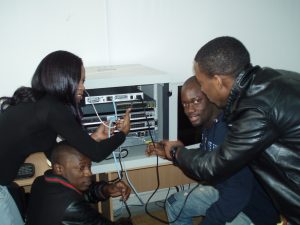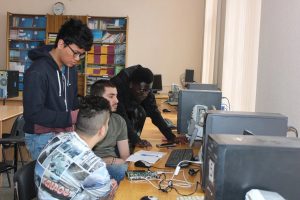Bachelor of science in Computer Engineering
Bachelor degree program in English was started by Kharkiv National University of Radio Electronics in 1999. The duration of undergraduate program is four years.
Program of Bachelor Degree in Computer Engineering successfully combines four main tracks: Software, Network Design, Hardware and Theory Courses.
Software Track
The Software Track provides students with skills that are widely applicable, highly in demand. Its disciplines concern with the processes, methodologies, techniques, and tools of developing high-quality software applications for modern operation systems Windows, Android, iOS. The students get a good knowledge of the most widespread software engineering technologies with Microsoft .NET, Database with SQL and Oracle, Java and JavaScript, OpenGL, DirectX, C#, Python.
Core Modules:
- Programming basics
- Object-oriented programming
- Programming using C/C++/C#
- Desktop programming
- System Programming
- Database basics
- Object-oriented design
- Database Management Systems
- System Software
- Internet programming
- HTML
- CSS
- Web-programming
- Java, JavaScript, Python
- Mobile & embedded
- WinPhone, Android, iOS
- Xamarin, Unity, PhoneGap
- Project management
– SCRUM, KANBAN, PMI
- Parallel and distributed programming
- Network programming
- OpenMP
- MPI
Network Design Track includes:
Computer Networks
- Internet of Things
- LAN and Wireless Networking
- Network Security
- Wireless Ad-Hoc and Sensor Networks
- Network Management
- Industrial
In this track, students obtain skills of deep understanding of network technologies and communications; practical experience in networks deployment and configuring on the basis of Cisco and D-Link switching and routing devices; practical experience in deployment of IP-telephony. In the frame of this track, the students combine computers, sensors and actuators to the single organism, which is able to solve all the tasks of the industrial object management. The track includes Wireless Ad-Hoc and Sensor Networks, this course considers remote monitoring objects in a variety of contexts: in fire detection; seismic monitoring; nuclear power stations monitoring; remote monitoring & tracking of vehicles; the office and the factory; and, the home (automation and smart home).
Hardware Track includes:
Computer Logic
- Computer Electronics
- Computer circuit Design
- Microcontroller Systems
- Computer Architecture
- CAD systems
- Embedded systems in intelligent robotics
During the study of Hardware Track students uses hardware and labware of worldwide leading companies such as: ALTERA, Xilinx Spartan 3E FPGA, Lego Mindstorms NXT robotics blocks, ZigBee Texas Instruments modules. In the classes, students learn hardware description language VHDL used in electronic design automation to describe digital and mixed-signal systems such as field- programmable gate arrays and integrated circuits.
Theory Courses Track includes:
- Higher Mathematics and Numerical Analysis
- Physics
- Discrete Mathematics
- Probability Theory & Math Statistics
- System Modeling and Simulation
The theoretical courses we provide can be immediately applied to design new computers, programs, networks and systems, as well as to assist with analysis of data, producing reports, and presenting information.
The Industry Certifications are available in the KNURE:
- The regional Cisco Network Academy, located in KNURE offers a wide variety of certification courses leading to international
- The University’s Industry Certification center offers the programs of Microsoft IT Academy preparing the students for taking Microsoft Certified Professional (MCP)
- The Intel Software Training Program offers basic and advanced software development training


